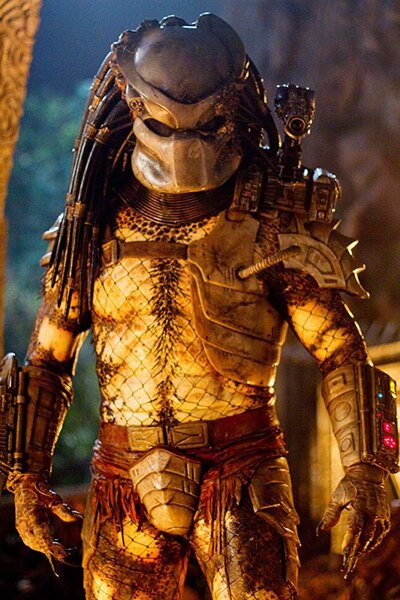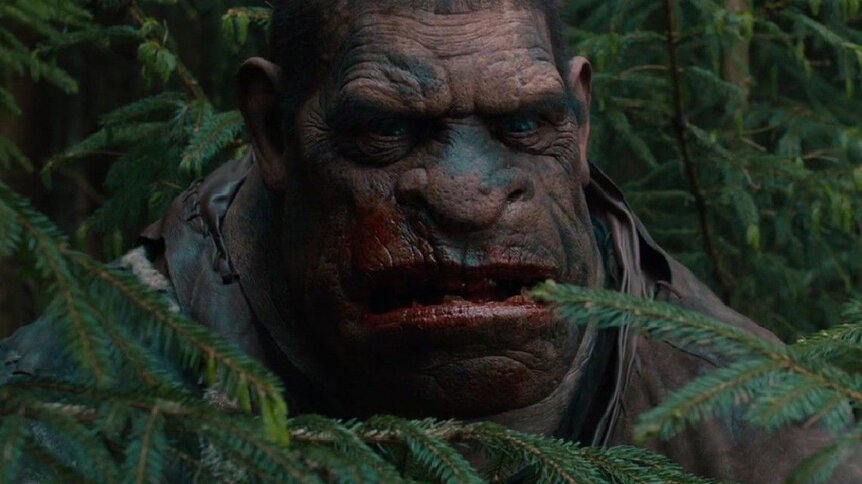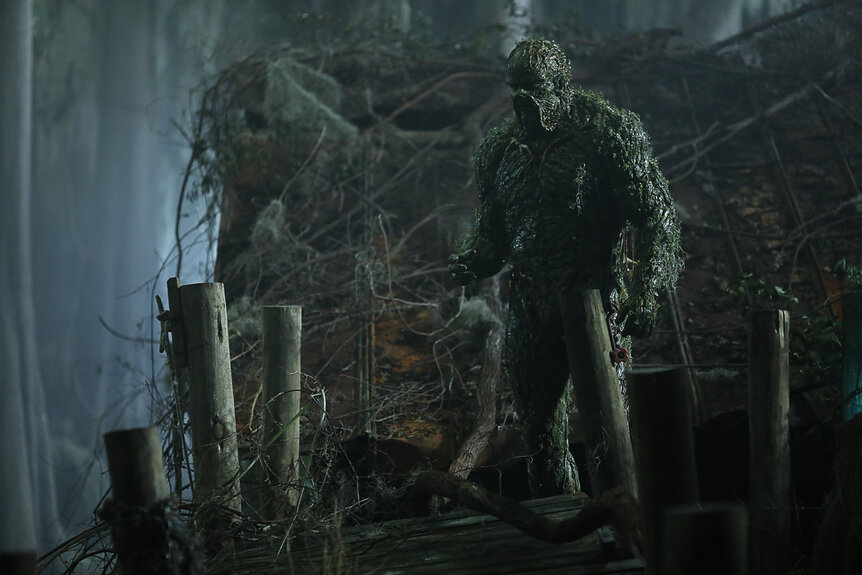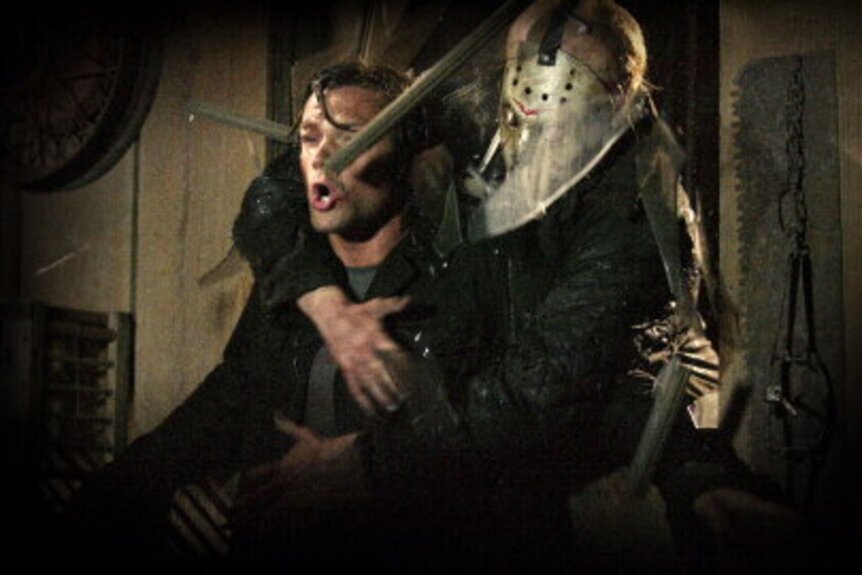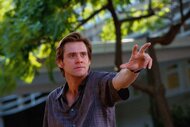Create a free profile to get unlimited access to exclusive videos, sweepstakes, and more!
Genre MVP: Inside Derek Mears' broken backs and Jason hockey masks

Genre fans have probably seen Derek Mears even if they don't recognize his face, which was notably hidden behind a hockey mask when he played Jason Voorhees in the 2009's Friday the 13th. The actor and stuntman is a sci-fi and horror mainstay, having also appeared in Predators, Pirates of the Caribbean: On Stranger Tides, Hansel & Gretel: Witch Hunters, and Alita: Battle Angel. He also played the title role in DC Universe's Swamp Thing. And, while Mears is one of the go-to actors if you're going with prosthetics, he's also worked with the improv team The Resistance.
SYFY WIRE got a chance to chat with Mears about being a genre MVP, costume work, the physicality of roles like this, future Friday the 13th films, and why he's such a nice guy underneath the scary costumes and prosthetics.
How did you break into the costume/creature field?
It was really early, on my first custom prosthetic job. I was hired for the re-shoots for Wild Wild West, the movie with Will Smith. And I met Rick Baker there, and Rick and I hit it off. I thought he was great. And then Rick would call me up afterward and go, "Hey, do you want to come work on Men in Black?" Or, "Hey, do you want to come work on this other show?" He introduced me to Wes Craven. So yeah, that's kind of how I got into, started falling into doing prosthetic and creature work.
We spoke many years ago on the set of Predators, and you talked about some of the difficulties of working in costume. What's been the most difficult makeup or costume you've had to work with?
The most difficult one was from Hansel & Gretel: Witch Hunters, playing the Edward character. It was brutal because — we fought to do it all practical, because the studio wanted to do it CG. But the crazy part of the story is that week one of a three-month shoot in Berlin, I got a herniated disc in my neck because of the weight of the animatronic suit. And I was in fighting shape, ready to go, and it just went out. So to finish the show, I told the producers at one point, because they were panicking, going, "We have scenes to shoot tomorrow, what do we do?" I said, "Look, if it hurts the performance, please replace me. But I've spent so much time putting this all together and working with the animatronics as a team," I said, "we have the right team to pull this off."
I told them, "Feel free to replace me, but I told you I'd give you blood." This was Tommy Wirkola, the director's first big Hollywood movie. [I said,] "I told you I'd give you blood when we talked about meeting originally, and now it's time for me to put up or shut up." So it was crazy. I had to go to the doctor multiple times there in Germany and get spinal injections just to finish the show. My right side of my body started to kind of atrophy.
But, on the positive side, it was such a rewarding job because we pulled it off practically. What we're fighting for is not just to be able to pull off for this show, but I knew that Hollywood follows trends. And if we could do something that is based on practical effects, that we'll start seeing more and more of them in TV and film projects. That was the most difficult one I've ever done before. Brutal.
Obviously one of the skills you have to have for this job and for the stunt work you've done is keeping in physical shape. What other skills do you need for this sort of work? What advice would you give to actors who want to do this for a living?
The thing that drives me crazy about doing the prosthetic stuff is when people want to label you in a certain category because they don't know how to define you. "You're a creature actor." I'm like, "No, I'm an all-around actor who happens to be tall and physical." I'm a nerd representing nerds. But I love doing all of this work. I'm professionally trained, but it's just as an aspect of what I do.
So I try to tell younger actors, they're tall, but that can't be the only skill set they have. You got to train, you got to be an actor. You got to understand the script, you've got to understand story structure, you've got to understand basic human emotions. I try to tell younger actors that go out and have as much life experience as possible. Because the more experience you have, the more colors you'll be able to paint from in your acting color palette or your acting artwork. It makes it much more rich.
On the physical side, you always overtrain, so when it comes up on the day it's not as taxing because you've trained for it twice as hard. It's kind of like a martial arts fight where they're going to create five-minute rounds, you train 10-minute rounds. And then when the five-minute rounds come around, it doesn't faze you at all because you're already used to going bigger.
I don't think a lot of people know how much comedy you do. How did you get into that?
I've been doing improv comedy professionally since I was 17, and I still do it now in my 40s here in Los Angeles. But improv opened so many doors for me. Not just career-wise, but life-wise, where the basic motto of improv is "yes, and?" If you say no, it stops as things are moving forward. And by saying yes you're always welcoming. Saying, okay, I'm accepting what you're saying but now I'm going to add to it so we can move forward.
And that, in any part, every aspect of my life, has come to pay off because I've been so much more open to understanding people's ideas. Just being able to communicate clearly. The improv comes in handy every single day in life, but also on set. Working on Swamp Thing, for example, there'd be times I'd worked with actors who have different techniques that are the opposite of my own. Or directors who came in who had a specific style, the way they saw things. Some might be more visual, or some might be more subtextual in what they're going for, and they might communicate in different ways. So at the improv, you learn that we all bring something different to the table. And you learn to adapt with each person, the way they approach things. And also be able to express what you need for yourself to get across, whatever your technique is or whatever ritual you have. And to work together as a team. So improv has just been just a lifesaver throughout my entire career.
You've done films like MacGruber and shows like Community. Would you like to do more comedy?
Oh, absolutely. That would just be a blast. I mean, I just love the process of leaning more toward the horror aspect thing. Horror and comedy are basically the same thing. Comedy and tragedy are just the opposite sides of the coin, but they're very similar beats. Like, with the comedy, for example, where you say something once to establish it to what it is. Say the same thing twice, now you've confirmed what it is for everybody. On the third time you change it for the surprise. That surprise and that shock, that's where the comedy comes from.
It's the same exact thing with horror. You go watch some of the cliches of horror films. Like, you'll watch a scene and all of a sudden there is a guy in front of a window, but the camera's a little bit to the side of the window so you think someone is coming in through the window. No, no one's coming in through the window. They cut back to the shot. They show the guy next to the window again with a little bit of extra space on the side for the camera for someone to come through if they want. Nope, not coming through. The third time, show it again. Now it comes from somewhere else off screen, not through the window, and the guy gets tackled out of frame. And we all jump because we were expecting the window and it's something different that shocked us. So they're very similar lines between the two. But yes, I would, I would love, back to the beginning, I would love to do some straight comedy at some point, or more, I should say.
It's weird to think that it's been 10 years since Friday the 13th. What was the experience like?
Friday the 13th in '09 was a threshold for me. But afterward, I was so ... I mean, I loved the character growing up and I'm a huge horror nut, and it's my favorite horror series. So I was very honored to play the character, but I was blown away by the feedback of the fans. I think that's kind of the first point where they go, "Oh, he's not just the mask guy, he's bringing something else to the table." But ever since then like it's such a wild feeling to do a show that many years ago and every day being reminded about the character. Either on the street or social media or going to another feature or TV job. And have the people on the show go, "Hey, I saw you in this." It's an honor, but it's kind of overwhelming to think that I can travel to France or somewhere and someone will recognize me and go, "Oh, hey," because the character is known worldwide.
And the experience was so wonderful because the cast, we all still stay in contact, and it's so lovely seeing everyone being rewarded for their talents and hard work. They've all blown up in different aspects of the industry, and it just makes me so happy about, hey we have that. Remember that time we did that little thing together? Yeah, that little kind of special bonding moment between all of us.
There have been rumors forever about a sequel to the film. Is there anything you know, or anything you hope for?
I know they have the legal issues right now. That's why sequels haven't been made or new reboots haven't been made. I know people talked to me before about returning as a character. And I keep saying, look, even if I am not the character, I'm a huge Friday fan, much like the rest of us horror fans. Please just make a good Friday film and we will come out to see it. You don't need to reinvent the wheel. It's just like a lot of, we've had our own personal experiences with the character. We just want to see it continue.
